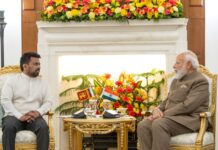It has been made clear by the International Monetary Fund (IMF) that it has not had discussions with Sri Lankan authorities about proposals for a digital services tax under the current programme.
In relation to Sri Lanka’s involvement in the OECD/G20 inclusive framework agreement for international company taxation, the IMF spokeswoman made clear that no recommendations had been made.
The goal of the OECD/G20 inclusive framework is to reduce tax evasion, strengthen international tax laws, and promote greater tax transparency. In accordance with this framework, 15 initiatives are being implemented in collaboration with more than 135 nations and jurisdictions.
In response to media stories and questions regarding its recommendations for the taxation of digital services in Sri Lanka, the IMF released a statement. The spokesperson emphasised that a key component of the IMF programme with Sri Lanka is revenue mobilisation. The IMF plans to discuss with the authorities the best way to raise additional funds during the first review of the Extended Fund Facility (EFF) programme, which is scheduled for September. This discussion may involve looking into the benefits and difficulties of enacting a digital service tax.
The IMF committed to collaborating with the Sri Lankan government to carry out changes that are in the best interests of the nation and its citizens.



